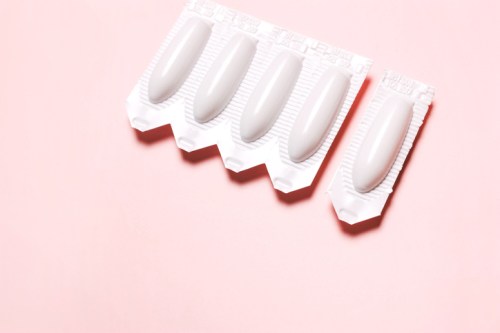It’s been clear for a while that vaginal washes, pH balances, soaps, douches, and “feminine” products aiming at helping the “smell” of your vulva aren’t that necessary or effective.
Experts in This Article
board-certified OB/GYN and chief medical director at Bonafide Health
urogynecologist, associate professor of urology, and OB/GYN at Cedars-Sinai Hospital
“That’s because vulvas and vaginas aren’t supposed to smell like floral body wash, and various odors that emanate from the area are normal,” says Karyn Eilber, MD, a urogynecologist at Cedars-Sinai. If anything, these washes can sometimes alter the naturally occurring microbiome of the vulva and vagina—putting the person at risk of yeast infections, bacterial vaginosis (BV), or mystery irritation that requires a trip to a healthcare provider. One new category of this complicated shelf of the drug store is vaginal suppositories. Like many health trends and innovations, there’s some white, some black, and a lot of grey when it comes to this sector of vaginal hygiene care.
So, first things first: What are suppositories, exactly? In short, they are forms of medication that get inserted into the anus or vagina to be absorbed by the body. Sometimes this is because the medication is most effective for that area of the body (like for yeast infections—more on that later). Other times, according to the Cleveland Clinic, it’s because the medication gets absorbed better there for several reasons. (For example, when babies can’t swallow large pills or doses of medicine, doctors will sometimes opt to administer a necessary medication via suppositories.) This method of taking meds is not new—however, some more modern products specifically for vaginas are.
What are vaginal suppositories
When it comes to vaginal suppositories, it’s important to get a clear picture of the intent and ingredients before putting anything in your body. “This is always true, but it’s especially crucial in this case, as many ingredients aren’t really going to help your vagina and could instead lead to some uncomfortable side effects,” says Dr. Eilber.
Take, for instance, feminine washes, like Summer’s Eve. These products often claim to preserve or improve the pH of the vulva. According to Dr. Eilber, these washes are intended for use on the external vulva area, including the mons pubis, labia majora, and labia minora. “It’s worth repeating that no vaginal washes should be used in the vagina,” she says. This is where vaginal suppositories enter stage left. These products are intended to be inserted into the vagina (similar to how one inserts a tampon). The question of whether or not they should go up there, though, is all about the ingredients of the suppository, your needs, and, if you have access to one, a provider’s opinion.
What you should know about feminine hygiene products
“For an external wash, any gentle cleanser is fine because the external genitalia [vulva] skin is similar to other skin. An internal wash is technically a douche, and the use of douches should be discouraged as internal washing of the vagina can disrupt the normal microbiome—aka the balance of all the different organisms that normally reside in the vagina. I always like to tell my patients that the vagina is a self-cleaning oven,” says Dr. Eilber. She adds that gentle soap and water on the outer area of the vulva are encouraged when you bathe yourself, and an array of vagina smells is absolutely nothing to be ashamed of.
Societal pressures can sometimes make people, especially adolescents, feel like they need to be odorless and pleasant smelling at all times. The truth is that the human body has a lot of different odors for a lot of reasons. Many of those are entirely normal, and when something is off (like a strong fishy odor from the vagina), it can indicate that you need treatment for an infection or illness. Neither end of the spectrum are things to feel ashamed of and merely a feature of biology, Dr. Eilber adds. If anything‚ it can help to remember that your nose’s ability to distinguish odors is evolutionarily valuable. Knowing something’s up with your body by sensing an atypical smell is a biological mechanism developed for you to survive.
That said, societal pressures are neither easy to shut off nor ignore—and, as a result, it makes sense that some may want to take matters into their own hands. As far as scents go, experts’ resounding opinion is that you shouldn’t be putting anything in the vagina to alter how it smells (or tastes).
Why? Because ingredients like waxes, oils, fragrances, and so on can have some seriously less-than-stellar effects. “Suppositories just to add freshness or reduce the odor that contains potentially harmful ingredients such as glycerin, phthalates, propylene glycol, and so on should absolutely be avoided,” says Dr. Eilber. “These ingredients may make a vagina owner more prone to infections or cause irritation.”
When are vaginal suppositories helpful
The above being said, there are some vaginal suppositories that are really useful and even vital for the vagina. For example, yeast infection treatment medication like Monistat is a vaginal suppository that people take when they have a yeast infection in the vagina.
Another newer type of vaginal suppository is called “boric acid” suppositories. These land in a distinct grey area between a full green light or red light from experts. For context, the vagina typically maintains a pH (acidity level) of 3.8-4.0, according to Alyssa Dweck, MS, MD, FACOG, obstetrician, gynecologist, and chief medical officer of Bonafide. A pH above 4.5, according to the Dr. Dweck, indicates a potential bacterial vaginosis infection. Your provider can test your vaginal pH and will often perform other tests to identify the nature of an infection or source of irritation.
If your vaginal pH is chronically off (if you, for instance, have frequent or recurrent infections that are treatment-resistant, some providers may recommend using boric acid suppositories. These suppositories can help support the balance of a healthy pH in the vagina and hopefully reduce the instance of infections, says Dr. Dweck. These are typically utilized farther down the road after other treatments proved ineffective, or in tandem with some medications.
Bottom line? It’s imperative to seek the advice of a healthcare provider before utilizing vaginal health products, including newer wearables that measure various biomarkers. (And FWIW, it is exciting to see developments that people with vaginas can access to better their vaginal health when things like BV, yeast infections, and other frustrating and uncomfortable symptoms arise.)
Sign Up for Our Daily Newsletter
Get all the latest in wellness, trends, food, fitness, beauty, and more delivered right to your inbox.
Got it, you've been added to our email list.











